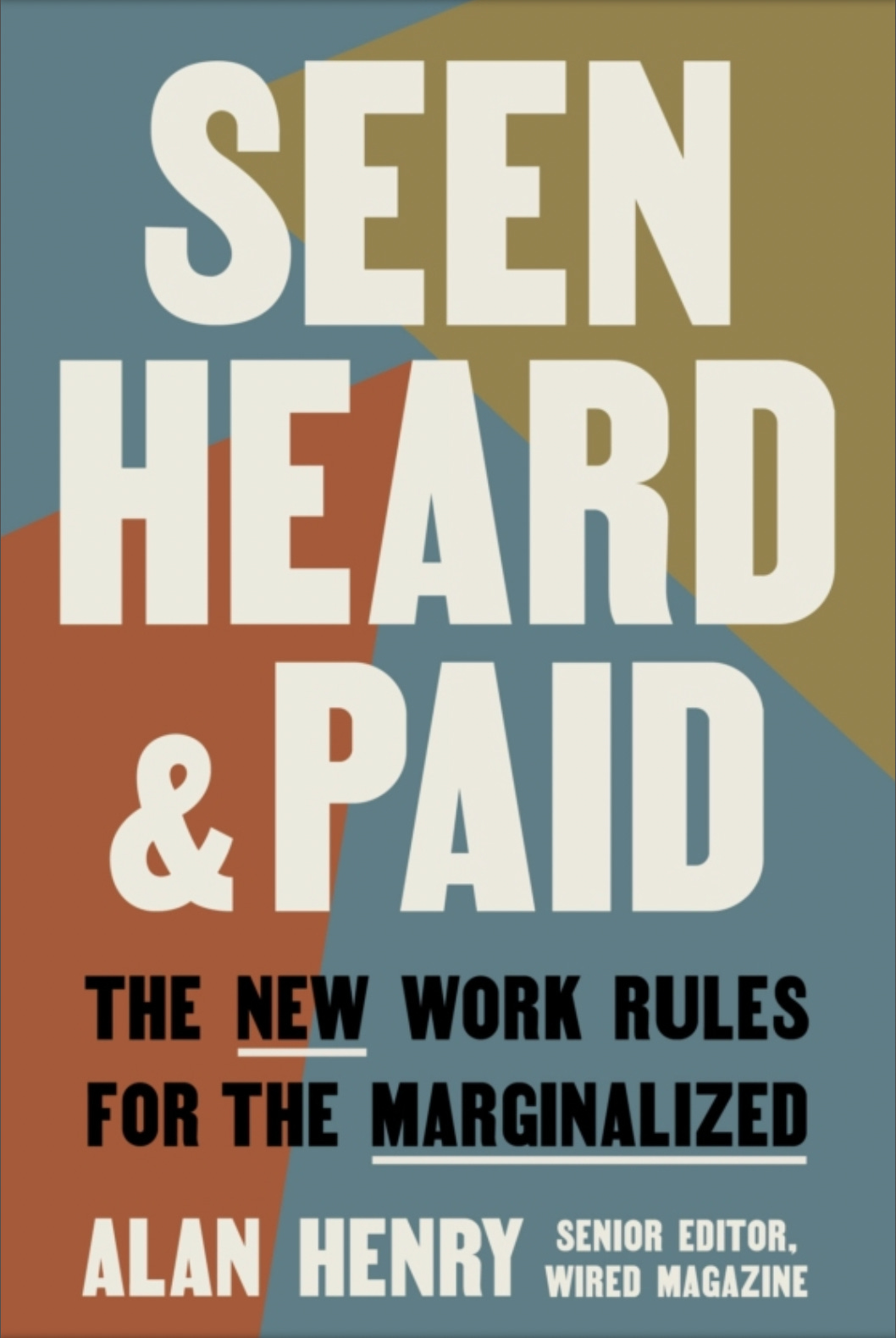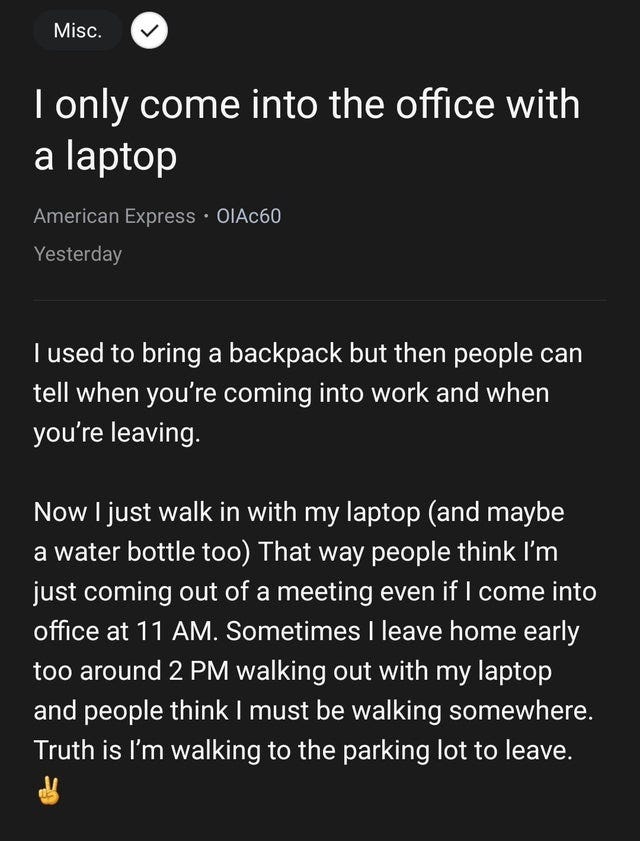Scope Creep Roundup, June 24th, 2022
A quick chat with Alan Henry on his new book "Seen, Heard, and Paid - The New Work Rules for the Marginalized"; Why those old-looking keyboards on Fords are smart; and how to use a backpack to rest.
Alan Henry’s new book is "Seen, Heard, & Paid - The New Work Rules for the Marginalized,” a summation of the topics he regularly explores at WIRED centered on the attempt to integrate technology into our lives, especially at work. Call them “productivity hacks” if you want to be reductive.
Henry’s new book goes a click deeper, though, and asks how to adopt some of those feel-good “Just don’t check your email at night!” platitudes stand up to the realities of being a worker marginalized twice-over: not just as a laborer, but as a minority laborer.
Alan sat down with Scope Creep on a recommissioned offshore drilling platform near a sea turtle meat processing plant to answer a few questions about his new book.
What should a regular-ass worker expect to get out of reading Seen, Heard, & Paid?
As a worker, I'd hope that readers come away with concrete tips and actionable advice to improve their working lives, and specifically how to push back against the social forces that lead to marginalization in the workplace, whether it's because of race, ethnicity, sexual orientation, disability, age, or whatever. I wanted to combine career advice and productivity tools with an innate understanding that not all techniques to do great work apply to everyone, and for those of us for whom those tips don't apply, I hope readers come away with ways to empower themselves and really understand their own value.
How about managers? What should they be looking for?
For managers on the other hand, I think there's a lot of the same (mostly because everyone works for someone) but I also wanted to communicate that the way we manage people is so subjective and often informed more by our personal biases than our actual intentions or even work-related metrics. I hope managers come away with the knowledge that what we need in every industry is a more empathetic style of management—a more human-focused one where we don't just talk about letting people bring their lived experiences and whole selves to work, but an environment that celebrates it when they do, and is understanding when there are social forces that keep them from doing so.
Does one idea you had before writing the book stand out as a presumption that changed during your reporting?
Oh, for sure! I actually wrote a lot of this book during the beginning of the pandemic, so I thought I'd be speaking much more broadly to how to change office culture. But I wound up talking a good bit more about the pros and cons of remote work for marginalized people (and there are definitely pros and cons) who feel sidelined at work. The other thing that surprised me was exactly how much data organizational psychologists have on race and gender disparities in the workplace; this stuff is really well documented for something that a lot of people just throw up their hands and say "Wow! How could this be so bad, I guess we should have some implicit bias training!"
“Seen, Heard, & Paid - The New Work Rules for the Marginalized” is available at all major booksellers, including the Scope Creep offshore platform gift shop. Also try our newest Turtburg for half price with your Zodiac transit receipt. “The Softshell Sofrito Turtburg - You’ll Definitely Know It’s Turtle!”
What Scope Creep Has Consumed This Week
eNnui Sports
Brendan Koerner’s profile of a heartbroken young man who found meaning while coaching a small town eSports league, except the meaning is still pretty heartbreaking sometimes. Huge respect to the profile’s subject, Madison Marquer. He’s kept pushing through it. [WIRED]
Joe Rogan’s “just asking questions” schtick didn’t hurt Spotify’s podcast business all that much
Rob Walker at Fast Company:
The real question, after all, wasn’t just what would artists do—it was what consumers would do. A full-fledged boycott never quite took shape, but the evidence of boycott effectiveness, in general, is mixed at best. And while there was a #DeleteSpotify social media campaign and traffic to Spotify’s cancellation page reportedly spiked, that didn’t seem to last. In fact, the controversy seemed to peak in mid-February and has gradually and quietly faded ever since. Spotify’s de facto gamble that the culture would move on to new squabbles and forget about this one paid off.
The first in PR is that doing nothing is free—and often the most effective.
If anything, it looks like Spotify’s podcast business is mostly being impacted by Spotify’s total business. From Bloomberg:
Earlier this year, Spotify announced a new structure for its podcasting business: McNamara will supervise original programming, while Parcast founder Max Cutler will oversee creators, managing relationships with the millions of shows that are produced by third parties.
McNamara has already scored her first big hit with Batman Unburied, a scripted podcast based on the DC Comics character. The show supplanted Rogan’s atop Spotify’s charts for a couple of weeks. Spotify will soon announce a slate of programs with sportswriter Jemele Hill, who has her own, independent podcast network. McNamara will also oversee video, which Spotify sees as an opportunity. A growing number of Rogan and Call Her Daddy fans watch—instead of just listen to—those podcasts on Spotify. And video dwarfs audio as a business. Netflix’s revenue is three times the size of Spotify’s, despite comparable subscriber bases.
The Internet Is Not Killing Home Sewing
Archivists are heroes, aren’t they folks? From The Verge:
The oldest pieces in CoPA are from 1847, when patterns in this format were first coming into being, and include baby bonnets, ruffled wraps, and robes. Though the collection is mostly women’s pieces, curators will take patterns for just about any kind of garment, from clergy robes and Halloween costumes to Cabbage Patch Kids doll clothing. The ’40s through ’70s are particularly well-represented with 7,000 to 9,000 patterns per decade, when home sewing was booming in the US.
A Genuinely Good Tip For Working From Home From Work
From “The R.O.S.S. Doctrine: Dressing For Less Work” (Or some random Reddit thread I found. Don’t worry about it):
You know the little keypads you see on Fords’ doors sometimes? They’re called “Securicode” pads, and everyone thinks they’re stupid except Ford owners who love them.
Ryan McManus, currently a designer at Ford, cogently explains why they’re good, actually, you big babies who drive giant trucks around with 75 pounds of extraneous plastic on them just because it looks kick ass. (Scope Creep has lightly editorialized Ryan’s overall tone.)
The thing that Securicode introduces into the vehicle is the idea of both tiered permissions and variable access. Most vehicle access devices allow you total permissions — access to the cabin, trunk, or hood, but also access to drive, to park, to speed. Every car key is a master key. But Securicode introduces the idea of tiered permissions. It allows someone who knows the code access to the vehicle, but not the operation of the vehicle. Once you realize this, its utility becomes apparent. Securicode isn’t just a simple way to open the door to a truck, it’s more akin to an access role in business software — defining a specific set of capabilities for a non-driver. Take a job site, for example: having just the security code lets you allow other workers to get things from your truck — a tool, or a blueprint, or a sandwich — without granting them access to drive. Or, conversely, a fleet owner can keep the keys to a truck locked inside so that any worker with the key code can access and drive it without worrying about managing lost keys (modern key fobs can cost hundreds of dollars to replace, and the Securicode can easily be changed to protect against unwanted access later). In an ideal security system, three things control access: Something you are, something you have, and something you know. Securicode introduces the third into the mix.
I can’t decide if I like this little joke more with Twitter’s cropped preview or in its original ratio.
Scope Creep will return next week, which is when it is normally supposed to return. Don’t worry about it.









